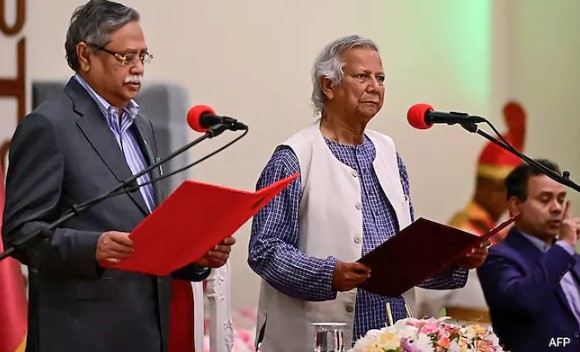Nobel Laureate Muhammad Yunus has officially taken on the role of the head of Bangladesh’s interim government, marking a significant shift after 15 years of Sheikh Hasina’s tenure as prime minister.
At the swearing-in ceremony on Thursday, Yunus vowed to uphold and protect the constitution, expressing his commitment to perform his duties with sincerity. This transition comes amid a period of turmoil in Bangladesh, where violence and clashes have persisted even after student-led protests led to Hasina’s resignation and departure from the country on Monday.
Yunus, aged 84, who was awarded the Nobel Peace Prize in 2006 for his groundbreaking work in microcredit and microfinance through the Grameen Bank, was sworn in shortly after returning to Dhaka from Paris, where he had been receiving medical treatment. The oath was administered by Bangladesh President Mohammed Shahabuddin at the official residence, Bangabhaban.
Indian Prime Minister Narendra Modi extended his congratulations to Yunus, expressing hope for a quick return to stability in Bangladesh. PM Modi highlighted the importance of ensuring the safety of Hindus and other minority communities, stating that Bharat remains dedicated to working with Bangladesh to achieve shared goals of peace, security, and development.
In his new role, Yunus will serve as the chief adviser of the interim government, a position similar to that of a PM. He will be supported by a 16-member advisory council, which includes key figures such as Nahid Islam and Asif Mahmud, who played crucial roles in the protests that led to Hasina’s removal.
Other council members include rights activist Adilur Rahman Khan, women’s rights advocate Farida Akhtar, Grameen Telecom trustee Nurjahan Begum, former foreign secretary Touhid Hossain, and AFM Khalid Hossain, deputy chief of the right-wing party Hefazat-e-Islam.
In a statement before the swearing-in ceremony, Yunus described the day as “glorious” and referred to the events as a “new victory day” for Bangladesh, symbolising what he called the nation’s “second independence.” He urged the restoration of law and order, calling on the public to ensure peace and prevent any further attacks, stressing that the country must come together as one family.
The unrest in Bangladesh had been brewing long before the January 7 elections, which saw Sheikh Hasina’s Awami League secure a landslide victory amidst widespread allegations of electoral malpractice.
The situation escalated in June when students led a fresh wave of protests after the Bangladeshi high court reinstated a controversial 30 per cent reservation in government jobs for the families of freedom fighters and veterans of the 1971 War of Independence. Although the Supreme Court later scaled back the quota, Hasina’s handling of the protests and her reported derogatory remarks about the protesters fueled widespread anger.
The protests culminated in massive demonstrations on Monday, with hundreds of thousands of students taking to the streets and marching towards the PM’s official residence, Ganabhaban, forcing Hasina to resign and flee to Bharat. Despite her resignation, violence has continued in parts of the country, with reports of targeted attacks against minorities, including Hindus.

















